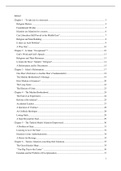Samenvatting
Summary Islamic Exceptionalism: How the Struggle Over Islam Is Reshaping the World
- Instelling
- Rijksuniversiteit Groningen (RuG)
English summary for the book 'Islamic Exceptionalism: How the Struggle Over Islam Is Reshaping the World' from Shadi Hamid. This summary is also available in Dutch for students Middle-Eastern Studies at the University of Groningen. For the Dutch summary look at my profile. In the Dutch summary a su...
[Meer zien]




